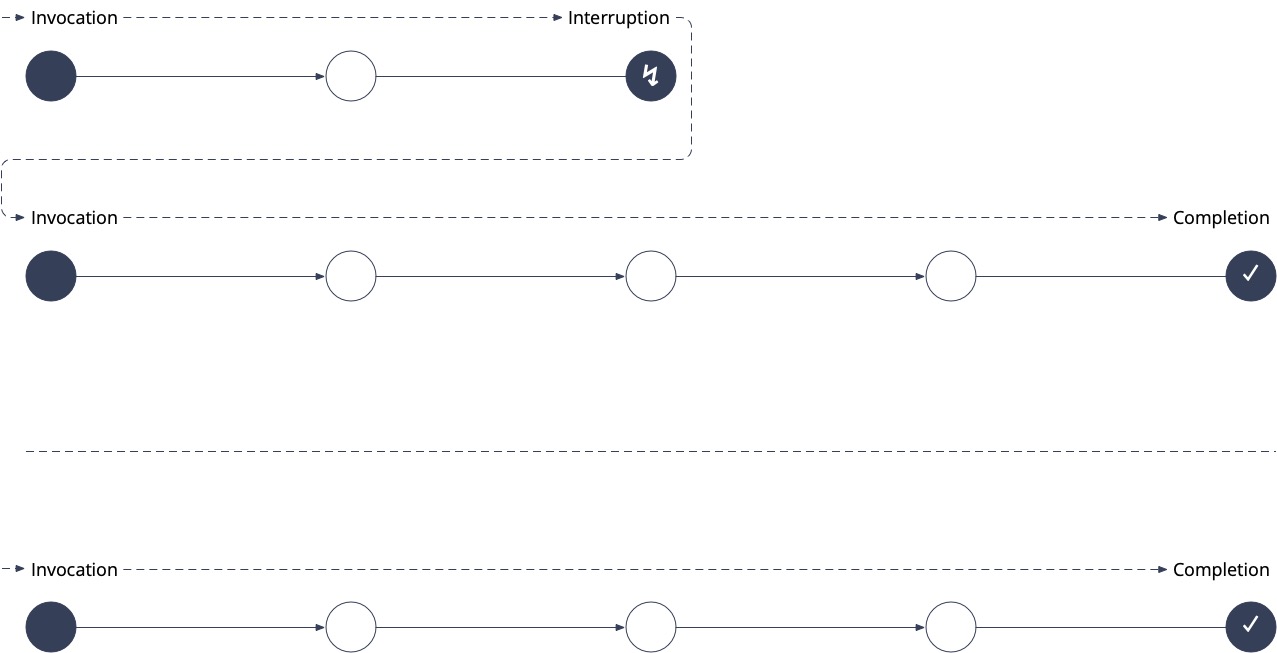Overview
Distributed Systems
A distributed system is a set of concurrent, communicating components that communicate by exchanging messages over a network. Each component has access to its own state but cannot access the state of other components.
Distributed Execution
A (function) execution is recursively composed of other (function) executions, often called steps.
A distributed execution is an execution distributed across the components of a distributed system, where each component performs a portion of the execution.
Functions and Promises
function* foo(context : Context, m : number) {
let r = 0;
for(let i = 0; i < m; i++) {
// remotely invoke bar
const p = async_r bar(i)
// await promise
const v = await p
r = r + v;
}
return r;
}
Just like async await is based on functions and promises, Distributed Async Await is based on durable functions and durable promises. Durable Functions and Durable Promises guarantee continuity in case of interruptions.
Distributed Async Await is a variant of Durable Executions. A Durable Execution is a function execution that, if the execution is invoked, interrupted, restarted, and completes, is equivalent to some function execution that is invoked and completes. Therefore, Durable Executions provide resume semantics in case of an interruption.

Mechanics
Distributed Async Await durably persists the state of an execution after each step of the execution. In case of an interruption, the system recreates the function execution from the persited state and continues from there.
In traditional, ephemeral async await, the state of a function execution-its control flow and local variables-is stored in ephemeral memory. If the process hosting the function execution crashes, the function execution is lost.
In Distributed Async Await, the state necessary to recreate the function execution is stored in durable memory.
Steps and State
In Distributed Async Await
- a function invocation creates a durable promise, and
- an await suspends on that durable promise.
Consider the following function that is equivalent to an unrolled foo(3):
async function foo() {
let r = 0;
// 1st iteration
const p0 = async_r bar(0) // invoking durable function
const v0 = await p0; // awaiting durable promise
r = r + v0
// 2nd iteration
const p1 = async_r bar(1) // invoking durable function
const v1 = await p1; // awaiting durable promise
r = r + v1
// 3rd iteration
const p2 = async_r bar(2) // invoking durable function
const v2 = await p2; // awaiting durable promise
r = r + v2
// end
return r
}
Durable promises persist the return value of the function execution they represent. If the execution crashes and restarts, the execution deduplicates function invocations and their return values, effectively recreating their execution state before the crash.
On restart, invoking a durable function that was already invoked is safe: the durable promise already exists, the invocation will be deduplicated. Awaiting a completed durable promise is safe: the durable promise is already completed, the execution immediately yields the same value.
In other words, the execution does not need to durably persist its ephemeral execution state. Instead, durably persisting the return values of child functions is sufficient.

